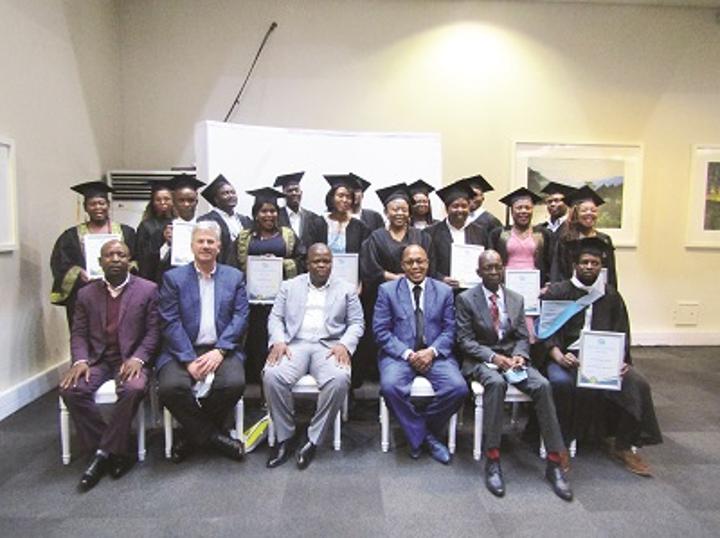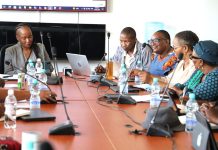Africa-Press – Lesotho. The Lesotho National Development Corporation (LNDC) in partnership with the Agricultural Produce Agents’ Council (APAC) of South Africa (SA) awarded fresh produce agents’ certifications on Wednesday.
After a three months long online course, 16 trainees graduated and were awarded APAC certificates by the two institutions. An overview of the LNDC strategic plan indicates that LNDC seeks to put significant financial resources
and a technical know-how into the sector where over just 70% of the people in Lesotho earn a living and a subsistence agriculture which is critical to
realising the ideals of a shared, inclusive and sustainable growth as espoused in the National Strategic Development (NSDP) Plan II. “LNDC is working to
reposition the country as an agricultural powerhouse in Southern Africa by developing local supply chains and plugging into regional value chains through
a highly reformed approach and plan towards global competitiveness,” reads the pertinent part of an overview. Speaking at the ceremony, LNDC Chief Executive Officer (CEO) Mohato Seleke said the ceremony is a major
milestone in the development of the soft infrastructure required to run a commercial commission based fresh market produce, a system that requires certified fresh produce agents who clearly understand their role and
responsibility to the farmer and the consumer. Seleke noted that the partnership with APAC, under APAC Registrar Francois Knowles leadership, has been a true turning point to get to the status of fully certified market agents
in a matter of weeks. “The certified Fresh Produce Agents are going to be the centre piece for formal fresh produce trading system in Lesotho, these are
ambassadors for change, they are game changers. This graduation has come at a time when farmers are putting seed in soil, now the answer to market accesses
is there as a proof that the LNDC is committed to deliver on its mandate and 2018-2023 strategic plan and the NSDP II priorities, particularly commercialising agriculture.
This is a major step toward realising a dream, a dream to transform a sector heavily dependent on government subsides, a sector that is a perennial underperformer yet it
carries with it the fate and the fortunes of hundreds of thousands of rural households. This day gets us closer towards a dream of modern, market based
commercial agriculture with the horticultural space in Lesotho,” Seleke said. He said at home, agriculture is the fourth largest sector, contributing 5.8% of the Gross Domestic Product
(GDP) since 2016 saying for the past 10 years, it has been growing at 5% average
per year. “It employs about 48% of the total employed persons in Lesotho. From 2012 to 2016, imports of food and other agricultural products grew at an average
rate of 14.7% from US$220 million to US$380 million. Similarly, the food and other agricultural products by an average of 12% each year during the same period,
recording a trade of US$342 million in 2016,” he added. Seleke noted that the above indicators tell a story familiar across the region and the continent, also pointing out that agriculture done
right holds a tremendous potential. Knowles said it has been an honour for him to share his knowledge and experience with the trainees. He said he learnt a lot from them, and he witnessed that they are physically strong “I
do not regret investing in them as I am pretty sure they will take agricultural sector to the higher level in Lesotho”. He said to the graduates that they are expected to contribute to the growth of
Lesotho’s economy, and to always preserve the integrity. Speaking at at the ceremonyetitiveness. ly chains and plugging into regional value chains through a highly reformed approach and plan
t the ceremony, the Minister of Trade and Industry Dr. Thabiso Molapo said this occasion emanates from an initiative aimed at achieving the National Vision 2020 aspirations and its implementation framework, being the NSDP II.
Molapo expanded that the NSDP II amongst other priority sectors, singles out agricultural sector commercialization as critical to achieving food security, building economic
diversification, import substitution, and improving employment opportunities especially for semi-skilled and skilled youth. He added that commercial primary agriculture is paramount to building a
strong industrial economy through agro-processing of food, feed, cosmetics, and pharmaceuticals manufacturing, and other manufacturing products’ compounds, “agriculture
also has links to the development of a strong and diversified tourism experience”. “We are now a step closer to launching commercial commission fresh produce market centres for the first
time in Lesotho, and with our own local agents. It is one of the many initiatives that we should be patient and work together for their success. It is with deep patronage and pride that I wish to congratulate the trainees on
the job well done. The skills you have gained will go a long way in helping Lesotho develop a commercial agriculture economy and in advising on formulation
of requisite policy, regulatory and institutional reforms,” Molapo applauded the graduates. In an interview with Informative Newspaper, a Fresh Produce Agent Trainee Topela Libenyane said it
has been an honour for him to have been part of the training, as he is mostly passionate with farming and this has been a great opportunity for him. He said
as trainees, they are prepared to work with upcoming and existing farmers, and they will be assisting in ensuring that all local produce will be bought and exported. He stated that their work is to find a good market for Basotho produce.
For More News And Analysis About Lesotho Follow Africa-Press






